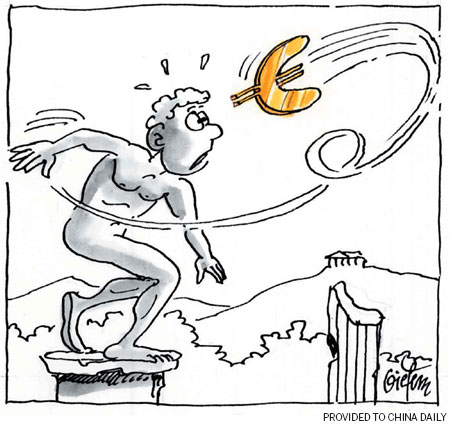EU falters in new deal
Updated: 2011-04-29 11:49
By Liu Mingli (China Daily European Weekly)
The deal on a number of measures to solve Europe's longstanding suffering over the eurozone debt crisis has done little to drive interest in the market. It is utterly powerless despite all of the high expectations and lengthy negotiations between European leaders.

As the Financial Times pointed out recently, Europe's leaders missed a good opportunity to come clean about the crisis.
The supposedly comprehensive solution was hashed out in March during a summit of European Union leaders in Brussels. The deal was made in the hopes that it would modify the current financial deal to rescue the EU and provide stress relief for debt-ridden countries like Greece. But it also aimed for long-term measures such as the establishment of a permanent European Stability Mechanism and the expansion of competitiveness among eurozone countries.
The new mechanism will replace the European Financial Stability Facility, which expires in 2013 and has a heftier capital base of 700 billion euros.
Despite tough negotiations before hashing out the deal, EU leaders praised the "comprehensive package" aimed at calming markets and fixing some of the euro's vulnerabilities. European Council President Herman Van Rompuy said the deal was the "Euro-Plus-Pact".
But the deal is in fact powerless, especially after all the compromises made by EU members. For instance, no clear agreement was reached on major issues such as an age standard for retirement, salary controls and a uniform tax rate.
Other issues were left without any practical solutions. Though member states agreed to expand aid funds and loans, no details were released on how much was invested in the form of aid. The public will likely doubt whether the EU is capable of coming up with a detailed agreement. German Chancellor Angela Merkel admitted that the summit didn't give answers to some of her questions.
It isn't an accident that the EU's great efforts at the summit were wasted. The summit was the very embodiment of systematic defects in the EU. Different markets, interests and politics limit and affect the EU's decisions. The debt crisis, under current circumstances, is likely to get worse in the short term.
Now with Spain insisting it will not become the next victim of the debt crisis after Portugal caved under widespread pressure and joined Greece and Ireland in requesting a EU bailout, things look bleak again.
Prior to the bailout plans, Portuguese Prime Minister Jose Socrates resigned after the country's parliament refused to endorse more austerity measures aimed at avoiding a bailout on March 23. Afterward, three agencies cut Portugal by notches and kept the country's rating on a negative outlook. Standard & Poor's downgraded its credit ratings on Portugal on March 29. Moody's downgraded its credit ratings on 30 banks in Spain on March 20. By the end of June this year, Portugal will have to pay for its debt of 9 billion euros, which is why it asked for the bailout.
Portugal, in becoming the third country to seek aid after Greece and Ireland, has destroyed global confidence in the EU's handling of the debt crisis. If Spain bows to pressure and the crisis, it will be very difficult to provide the EU's fourth largest economy with aid. The debt risk may also spread from country to country.
The banking sector is a dangerous area. Insufficient capital, financing difficulties and credit problems are what Europe is confronting now. What's more, European banks have a great deal of sovereign debt. European authorities are aware of the seriousness of the issue and have placed banks under stress tests, but test results were looked upon with skepticism by the market and investors.
Another problem is inflation. As the price of commodities rises, the current inflation rate in the eurozone has reached 2.4 percent.
Many new economies have raised their interest rates to counteract inflation, but the European Central Bank is keeping its interest rate at 1 percent for fear that once it raises the rate, it will be more difficult for countries such as Greece and Portugal to pay off their debts.
The debt crisis means more than debt itself, but it also means a lot of economic risks.
The author is a research fellow at the China Institutes of Contemporary International Relations in Beijing.
E-paper

Blowing in the wind
High-Flyers from around the world recently traveled to home of the kite for a very special event.
Preview of the coming issue
Image maker
Changing fortunes
Specials

British Royal Wedding
Britain's Prince William and his girlfriend Kate Middleton get married on April 29.

Costly dream
Uninhabited havens up for lease but potential customers face wave of challenges in developing them.

Models gear up car sales
Beauty helps steer buyers as market accelerates.
